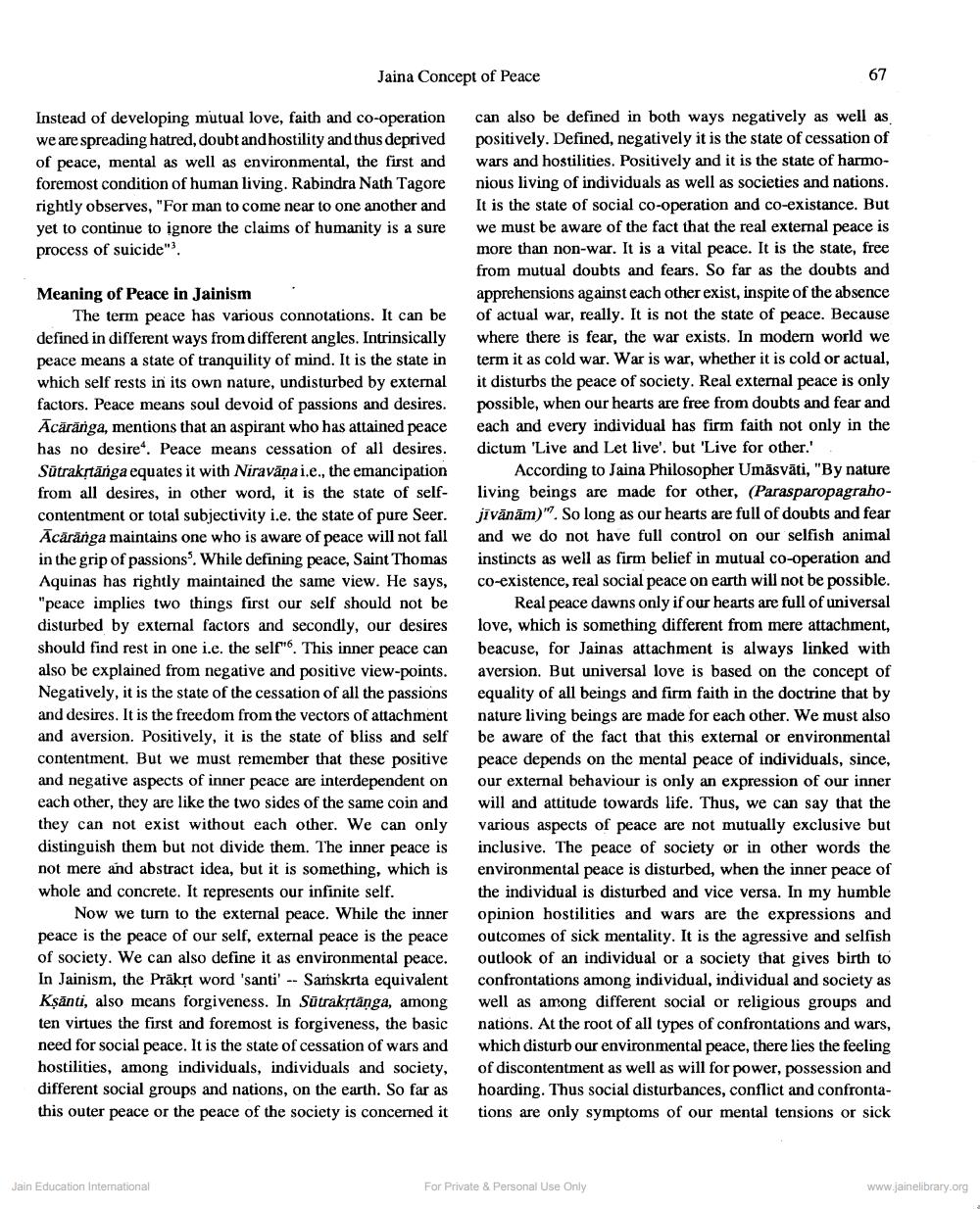Book Title: Jaina Concept Of Peace Author(s): Sagarmal Jain Publisher: Z_Jaina_Literature_and_Philosophy_a_Critical_Approach_001936_HR.pdf View full book textPage 2
________________ Jaina Concept of Peace Instead of developing mutual love, faith and co-operation we are spreading hatred, doubt and hostility and thus deprived of peace, mental as well as environmental, the first and foremost condition of human living. Rabindra Nath Tagore rightly observes, "For man to come near to one another and yet to continue to ignore the claims of humanity is a sure process of suicide"3. Meaning of Peace in Jainism The term peace has various connotations. It can be defined in different ways from different angles. Intrinsically peace means a state of tranquility of mind. It is the state in which self rests in its own nature, undisturbed by external factors. Peace means soul devoid of passions and desires. Acaranga, mentions that an aspirant who has attained peace has no desire. Peace means cessation of all desires. Sūtrakītārga equates it with Niravānai.e., the emancipation from all desires, in other word, it is the state of self- contentment or total subjectivity i.e. the state of pure Seer. Ācāränga maintains one who is aware of peace will not fall in the grip of passions. While defining peace, Saint Thomas Aquinas has rightly maintained the same view. He says, "peace implies two things first our self should not be disturbed by external factors and secondly, our desires should find rest in one i.e. the self"6. This inner peace can also be explained from negative and positive view points. Negatively, it is the state of the cessation of all the passions and desires. It is the freedom from the vectors of attachment and aversion. Positively, it is the state of bliss and self contentment. But we must remember that these positive and negative aspects of inner peace are interdependent on each other, they are like the two sides of the same coin and they can not exist without each other. We can only distinguish them but not divide them. The inner peace is not mere and abstract idea, but it is something, which is whole and concrete. It represents our infinite self. Now we turn to the external peace. While the inner peace is the peace of our self, external peace is the peace of society. We can also define it as environmental peace. In Jainism, the Prākṣt word 'santi' -- Samskrta equivalent Ksanti, also means forgiveness. In Sütrakrtänga, among ten virtues the first and foremost is forgiveness, the basic need for social peace. It is the state of cessation of wars and hostilities, among individuals, individuals and society, different social groups and nations, on the earth. So far as this outer peace or the peace of the society is concerned it can also be defined in both ways negatively as well as positively. Defined, negatively it is the state of cessation of wars and hostilities. Positively and it is the state of harmonious living of individuals as well as societies and nations. It is the state of social co-operation and co-existance. But we must be aware of the fact that the real external peace is more than non-war. It is a vital peace. It is the state, free from mutual doubts and fears. So far as the doubts and apprehensions against each other exist, inspite of the absence of actual war, really. It is not the state of peace. Because where there is fear, the war exists. In modern world we term it as cold war. War is war, whether it is cold or actual, it disturbs the peace of society. Real external peace is only possible, when our hearts are free from doubts and fear and each and every individual has firm faith not only in the dictum 'Live and Let live'. but 'Live for other.' According to Jaina Philosopher Umāsvāti, "By nature living beings are made for other, (Parasparopagrahojīvānām)". So long as our hearts are full of doubts and fear and we do not have full control on our selfish animal instincts as well as firm belief in mutual co-operation and co-existence, real social peace on earth will not be possible. Real peace dawns only if our hearts are full of universal love, which is something different from mere attachment, beacuse, for Jainas attachment is always linked with aversion. But universal love is based on the concept of equality of all beings and firm faith in the doctrine that by nature living beings are made for each other. We must also be aware of the fact that this external or environmental peace depends on the mental peace of individuals, since, our external behaviour is only an expression of our inner will and attitude towards life. Thus, we can say that the various aspects of peace are not mutually exclusive but inclusive. The peace of society or in other words the environmental peace is disturbed, when the inner peace of the individual is disturbed and vice versa. In my humble opinion hostilities and wars are the expressions and outcomes of sick mentality. It is the agressive and selfish outlook of an individual or a society that gives birth to confrontations among individual, individual and society as well as among different social or religious groups and nations. At the root of all types of confrontations and wars, which disturb our environmental peace, there lies the feeling of discontentment as well as will for power, possession and hoarding. Thus social disturbances, conflict and confrontations are only symptoms of our mental tensions or sick Jain Education International For Private & Personal Use Only www.jainelibrary.orgPage Navigation
1 2 3 4 5 6 7 8
